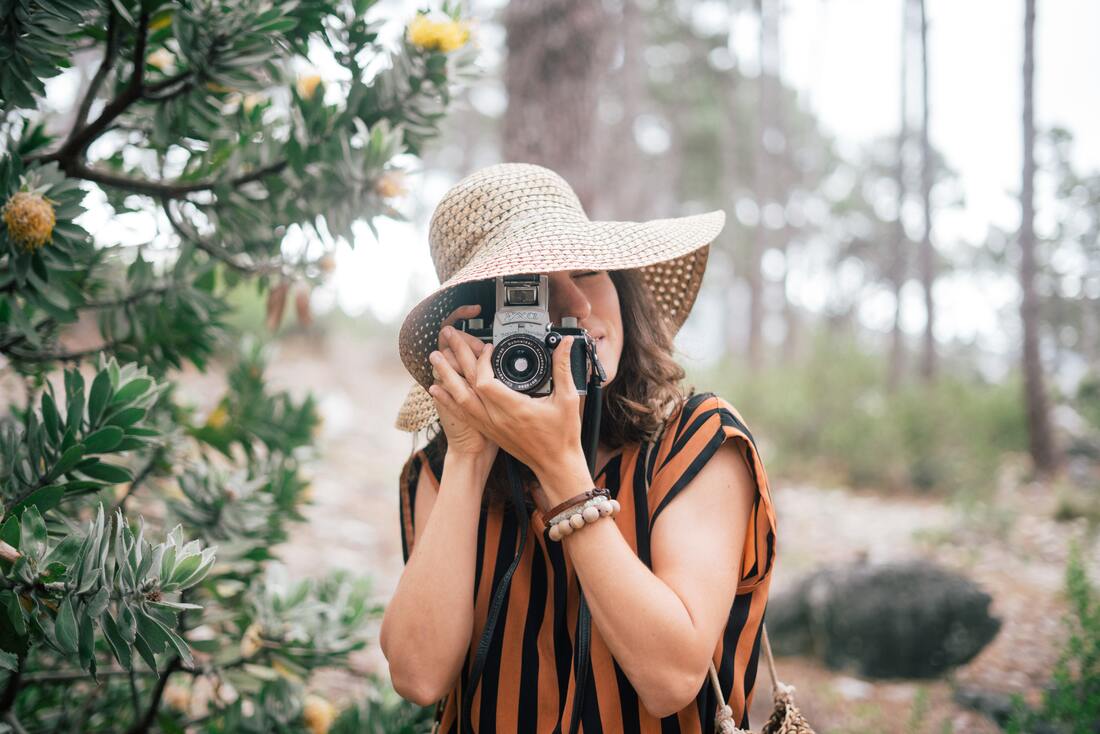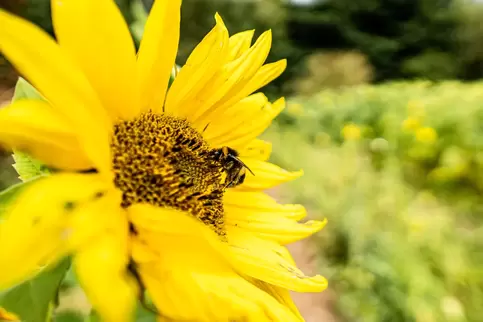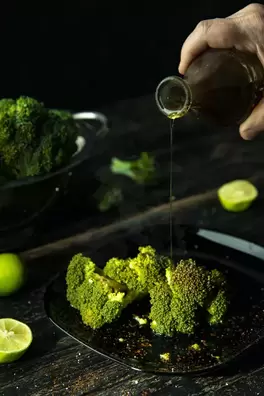 On this International Women's Day, let's take a moment to celebrate all women and girls who have influenced us to become who we are or whom we aspire to be. Our role models may include mothers and grandmothers, teachers and coaches, national and international figures, and even our own daughters but I hope that it can also include so many others who have somehow crossed our paths, young or old, living or not who have helped us reflect on ourselves, our purpose, and the energy or kindness that we put out into the world. It can give us new perspective to remember that our human connection is what makes us capable of resilience.
Though I'm reminded of several women who have been highlighted recently in the media because of their leadership roles advocating for gender and racial equity in education or art such as Malala Yousafzai or Jane Fonda, I'm particularly reflective today of a young woman named Courtney Yoder. I learned of her story on last night's 60 Minutes episode on the disparities of economic recovery during COVID. Courtney is 23 and has just had her first baby while navigating homelessness, hunger, and low-earning work. You can see the segment here. Had I not learned about some of her struggles, which included navigating the foster care system since she was 3 years old and thoughts of taking her own life when she couldn't find shelter, food, or income, I might have looked at her young, innocent, and sometimes smiling face and not given a deeper thought to the amount of inner strength, courage, and persistence that she had to summon just to be alive. It's very possible that if Courtney had not had to think about the welfare of her unborn baby, she may have given up all hope. I'm also reminded of Breonna Taylor and all the possibilities her life would have presented her had it not been cut short. Or the young woman who lost her fiance to COVID just before their wedding day who will never return to "normal" even at the end of this pandemic. Or the countless female doctors, nurses, grocery workers, who cannot take a day off. So, today, I hope we take time to think about not only the women who are near and dear or internationally known who have influenced us but also those whom we do not know who have somehow touched our humanity so that we may become better women in both our personal, professional, and civic lives. I hope that we can remember to be kind to each other, offer gratitude for what the day has offered us and what we have been able to offer, and always start with a kind word and thought toward our fellow human beings without negative judgement. We know not all of what each of us is carrying behind our smiles. I teach people how to uncover the wisdom they already carry to get new perspective on their parenting, health, and work with children and families. If you would like to feel less stressed, more confident, and happier in the way you parent, teach, lead, or live your life, GETnewperspective with me now. To your health! Dr. G. Photo by Luke Thornton on Unsplash I haven't written a blog post in a long while and I've been wanting to tell a story about teachable moments and making mistakes for many months. February is Black History Month and it seems fitting that I'm finally sitting down today (2/4/21) to tell this story.
During the summer, I was invited to write a column for my local newspaper on the topic of how to talk to children about racism and the pandemic. I had written about these subjects elsewhere on this blog before but not as one cohesive entry. I had to uncover a theme that could connect these two seemingly disparate topics. The concepts of persistence and resilience seemed to connect the two well, so I entitled the article Learning to Persevere: Talking to Children about the Pandemic and Racism. In it, I talk about simple life lessons I use in my parenting and professional development work, lessons I learned in my own Greek family and ones that can help guide families and individuals as we weather these stormy times. In the fall, I had recorded a special documentary on the life of Chadwick Boseman to be viewed later when I would have some time. I had become interested in learning more about this fine actor, as I had not known much, other than the fact that he starred in the film "Black Panther" and had recently lost his battle to colon cancer at the young age of 43. When I finally did play Robin Robert's ABC News Special: "Chadwick Boseman - A Tribute for a King," I walked away with many strong feelings. Some were associated with admiration and awe at a man whose strength and determination achieved so much in the last four years of his life, even while battling this unforgiving disease. Others dealt with sadness that he did not live longer to inspire more young people and do more good for our global community. Still others paralyzed me - they were feelings of dread and anger at myself for not having known an important fact I discovered only because I happened to watch this documentary. It turns out that one of the featured speakers on the special was Marc Lamont Hill, someone I had included in my article about racism and the pandemic. What I had not known while writing my article, and probably should have known, was that he was Dr. Marc Lamont Hill, a professor of media studies and urban education at Temple University. I had watched a piece on CBS News that showed a clip of him interviewing John Legend in the aftermath of George Floyd's death, where he was labeled a BET news personality, which also happens to be true. His words had inspired me to reflect more deeply on the distinction between hope and optimism and that's how I had infused him into my piece. This sort of misattribution by way of not fully rounding out his identity as a truly accomplished African-American academic, however, made me feel guilty for not having done any additional research before I included him in my narrative. I knew I had to fix that and fix it quickly but you know how it goes. The intensity of feeling slowly dissipates and then life happens and we don't do the things we've vowed to do. The truth is that I started writing this blog post in October but got interrupted and didn't go back to finish it, until now. The way this experience relates to parenting, child development, and reflective pedagogy is through teaching the significance of the adages "better late than never" and "always keep your word." It is never too late to own up to an error, whatever it may be. Making mistakes is how we learn, how we do better, how we develop a growth mindset at any age. I hope this story inspires you to start conversations with your loved ones about teachable moments. Some may seem small and insignificant but I guarantee you they can pollinate and shift perspectives that can last a lifetime. I teach people how to uncover the wisdom they already carry to get new perspective on their parenting, health, and work with children and families. If you would like to feel less stressed, more confident, and happier in the way you parent, teach, lead, or live your life, GETnewperspective with me now. To your health! Dr. G
Photo by Sam Hojati on Unsplash
May is the National Month for many worthy causes, including Brain Cancer, Celiac, and ALS awareness, but I would like to focus on the National Mental Health and National Mediterranean Diet pieces today. Like many professionals, I am concerned about how the pandemic is affecting the mental health of a generation of adults and their families now and in the years to come. Essential workers in any of the frontline fields who are keeping our economy and society moving forward at this time are experiencing unprecedented levels of sustained stress, but so is everyone else in the world to varying degrees since we're all experiencing the effects of the COVID-19 pandemic. During times of extreme stress, sustained hormonal cascades of cortisol, adrenaline, norepinephrine, etc., have the capability of changing our DNA through epigenetics. This means that chronic stress can turn on switches for predispositions to disease that we may not have ever experienced before this moment. It's a perfect storm for inflammation. Research shows that inflammation is the hallmark of chronic disease: instead of repairing, our cells are being primed for deterioration and decline and in the process changing our mood and thinking. That is, if we don't intervene in some positive ways.
There has been some media coverage recently about four positive ways to support our psychological well-being through use of the "4 Ms of Mental Health." I first heard about this mnemonic device from Dr. Sue Varma on CBS This Morning, my go-to morning news program. The 4 Ms according to this psychiatrist are: Movement, Mindfulness, Mastery, and Meaningful Engagement. The idea is that if we engage in each of these every day or frequently enough, we will be on our way to resilience in our mental health. If we move our body; if we do things that we love, creating chunks of time where we experience "flow" and develop higher-level skills; if we pay attention to the present moment instead of worrying about the past or future; and if we reach out to our family, friends, and wider community with kindness and generosity; we will be happier, calmer, and more resilient, even during times of high stress. These four Ms provide an excellent framework to remind us where our efforts and attention should be for the development and support of our mental health. I think it's important, however, to include a 5th M, one that is often forgotten, especially in the American culture: the Mediterranean diet. Eating nutritious, whole foods is data for our brain and gut, at the cellular level, for the promotion of overall health. Given my multidisciplinary training and holistic perspective, I view mental health as one part of the whole. Mental health is connected to physical health and vice-versa, with our gut health mediating and modulating how we think, feel, and behave. There's a slew of recent research connecting the microbiome to our mental health and affecting our risk for developing anxiety, depression, neurodevelopmental disorders such as ADHD and autism, and even neurodegenerative disorders such as Parkinson's and Alzheimer's disease. There is a comparable amount of research that is showing that the Mediterranean Diet can promote mental health and decrease risk for chronic disease through the reduction of inflammation in the body and the feeding of good bacteria in our gut. The Mediterranean Diet focuses on fresh, often organic and seasonal, fruits & vegetables high in prebiotic fiber, extra-virgin olive oil, fish & seafood, some meat, nuts & seeds, and a social and slow enjoyment of mealtime. Every family can start eating this way as a lifestyle change, as long as it becomes an expectation and there is an open invitation to all family members to contribute to meal-planning and cooking together. Organizing, preparing, and eating as a social experience is always going to be a meaningful, mindful, skill-building experience that requires movement; and perhaps that is the magic of the Mediterranean Diet: it combines all of the other 4 Ms of Mental Health while keeping our microbiome diverse, healthy, and thriving. I was privileged to present webinars on the topic of the 5 Ms of Mental Health to both the parent community of the Massachusetts Association for the Education of Young Children, and to that of the Montclare Children's School in NYC this month. If you'd like to access either of these, you can find them on my Facebook business page. I hope today will be the day you consider trying to cook a Mediterranean dish with your family and in the process slow down, laugh, and enjoy your time together. I teach people how to uncover the wisdom they already carry to get new perspective on their parenting, health, and work with children and families. If you would like to feel less stressed, more confident, and happier in the way you parent, teach, lead, or live your life, GETnewperspective with me now. To your health! Dr. G. |
AuthorAnastasia Galanopoulos, Ph.D. Parent, Educator, Health Activist. A note about my signature. When I first started teaching at Wheelock College, one of my first students with whom I still keep contact, started referring to me as Dr. G. In the affectionate spirit of its tone, I adopt that nickname here. Archives
March 2021
Categories
All
|



 RSS Feed
RSS Feed